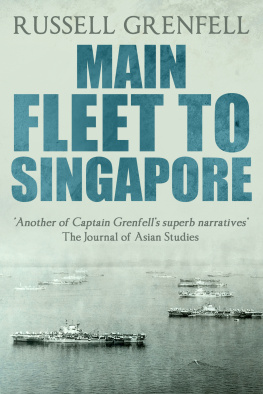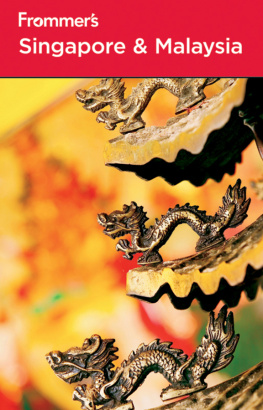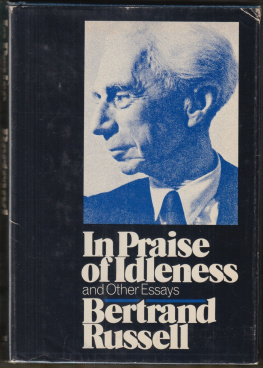Main Fleet to Singapore
Captain Russell Grenfell
Russell Grenfell, 1951
Russell Grenfell has asserted his rights under the Copyright, Design and Patents Act, 1988, to be identified as the author of this work.
First published in 1951 by Faber and Faber Limited.
This edition published in 2016 by Endeavour Press Ltd.
Table of Contents
Introduction
In writing this book, I am fortunate to have had the help of a number of persons who took leading parts in or were closely connected, directly or indirectly, with the operations or happenings with which the book deals. To all of these I wish to express my very best thanks for all the trouble they took in supplying me with information that I could not otherwise have obtained and in contending with my many queries. Such merits as this book may have will be due in large part to their generosity and patience. I wish, in particular, to record my indebtedness to Lady Phillips, Admiral of the Fleet Lord Chatfield, P.C., G.C.B., O.M., K.C.M.G., C.V.O., Admiral Sir Geoffrey Layton, G.B.E., K.C.B., K.C.M.G., D.S.O., Admiral Sir Ragnar Colvin, K.B.E., C.B., Admiral Sir Arthur Palliser, K.C.B., D.S.C., Admiral Sir William Tennant, K.C.B., C.B.E., M.V.O., Air Chief Marshal Sir Robert Brooke-Popham, G.C.V.O., K.C.B., C.M.G., A.F.C., Lieut.-General Sir William Dobbie, G.C.M.G., K.C.B., D.S.O., Lieut.-General Sir Lionel Bond, K.B.E., C.B., Lieut.-General A.E. Percival, C.B., D.S.O., O.B.E., M.C., and Air Vice-Marshal Sir Paul Maltby, K.B.E., C.B., D.S.O., A.F.C. I must, however, emphasize that none of them is in any way responsible for any of the opinions I have expressed, many of which some of them will not have read. Nor would it be proper to suggest that they necessarily agree with my presentation of the facts.
I am also very grateful to Mr. Henry Newnham for the trouble he was so kind as to take in reading the proofs.
For the naval operations in the central Pacific and the Coral Sea I have relied mainly on Captain Samuel Morisons excellent History of United States Naval Operations in World War II and the Battle Report series compiled by Captain Walter Karig, U.S.N.R., and others. Captain Morisons books, of which six volumes have so far been published, are the nearest counterpart in the United States to our official histories over here.
I much regret that I cannot make similar acknowledgment to our own official historians, but it is from lack of opportunity. If rumour be true, we have an extremely high-powered, streamlined, and efficient team at work on the official histories of the late war. But at the time of writing, more than five years after the end of the war, they have produced no naval histories. In this same period, it has been possible for the Americans to publish six volumes of semi-official naval history, and for Mr. Churchill, with all the cares of Leader of the Opposition to support, to publish four of his own.
Since, however, the Governmental version of what happened in the late war still remains hidden behind the Safety Curtain, Mr. Churchills revealing volumes are all the more valuable as works of reference; and, as the reader will find, I have not failed to make use of them. One of the most noteworthy features of these volumes is the extreme candour which informs them. There can have been few, if any, great wartime statesmen who, writing contemporaneously, have been so frank about the war of their time. Mr. Churchill has been frank not only about the mistakes of other people but, to his very great credit, frank about his own; and for this example of objectivity and self-disclosure, history will always owe him a debt of gratitude.
For the sake of brevity, I have referred in my footnotes to Mr. Churchills books The Second World War as Churchill, Vol ; and to Captain Morisons books, mentioned above, as Morison, Vol
Chapter One
The Rise of Westernized Japan up to the end of the Russo-Japanese War
The Far Eastern territories belonging to Britain in the year 1939 had all been gained for her through superior sea power. The particular method of acquisition had varied. Some had been bought, some leased, and some obtained by Treaty. Others had been conquered by soldiers of the British Army. But lease, purchase, cession or conquest had in each case been made possible by the supremacy of the British Navy among the fleets of the world. But for this, the soldiers could not have been transported eastward; or, had they got there, could have been turned out by superior forces sent by any foreign nation possessing command of the sea. Paramount sea power was the basic condition of British colonization in the Far East; or indeed anywhere else. By the middle of the nineteenth century, it had brought Queen Victoria the sovereignty over Australia, New Zealand, Hong Kong, the Straits Settlements, and parts of Borneo, while a British rajah ruled in Sarawak.
At this mid-century period, and indeed for long after, Britain was universally acknowledged as the leading sea Power of the world. Her numerous naval victories during the French Revolutionary and Napoleonic wars, and especially the dazzling successes of Lord Nelson, had given the British Navy a prestige that no other Power had as yet thought of challenging. Indeed, its dominant position was so firmly established as virtually to be taken for granted by everyone. And, for that reason, the safety of Britains overseas possessions east of Suez can have troubled the mind of no British statesman. Who could attack them? The British fleet could be reasonably certain of frustrating any attempt by a European Power; and outside Europe the only country with any pretence to a modern navy was the United States of America. But its fleet was then small compared to those of the European nations. The absolute security felt by British business men in places like Hong Kong can be gauged by the arrogance with which some of the heads of the great mercantile houses expected captains of the Kings ships to pay them the first call of ceremony.
Yet the seeds of change were nevertheless being sown. In the eighteen-fifties, in the heyday of British naval supremacy, came two occurrences which were destined to have a profound effect on the Far Eastern situation. One was the Crimean War, by which Britain and France barred Russias way to the Mediterranean from the Black Sea by confirming the closure of the Dardanelles to her warships. The Russian part of the Baltic being iced-up in winter, Russia had been anxious to secure access to warm water through the narrow waterways from the Black Sea controlled by Turkey.
Frustrated in this endeavour to reach the Mediterranean to the southward, Russia turned her gaze to the east. Far away, at the other end of the Asian continental mass, was the Pacific Ocean, bordered by the long coastline of China which reached right down into tropic waters. And China was governed by the Manchu dynasty, already well-advanced in the process of decay which had characterized all previous Chinese Imperial houses. Within two years of the end of the Crimean War, China had been induced to cede a large part of the Amur basin to Russia, and a period of Russian expansion in Central and Eastern Asia had begun. Some years later, the great trans-Siberian railway was commenced. Year by year it wound farther and farther east towards the Pacific coast. One branch was due to end at Vladivostock, a port on the Sea of Japan that Russia had managed to obtain from China in 1871. But as Vladivostock harbour is frozen over in the winter, plans were also laid to take another line south through Manchuria to the ice-free ports of Talienwan and Port Arthur in the Gulf of Pechili. These two ports still belonged to China, but Russia looked forward to arranging for their lease or cession.
But, after a time, Russia began to realize that unexpected obstacles were looming up in the Far East to the fulfilment of her programme in that area; having said which, we can now conveniently go back to consider the second occurrence of the eighteen-fifties which was to have far-reaching effects in Eastern waters.











